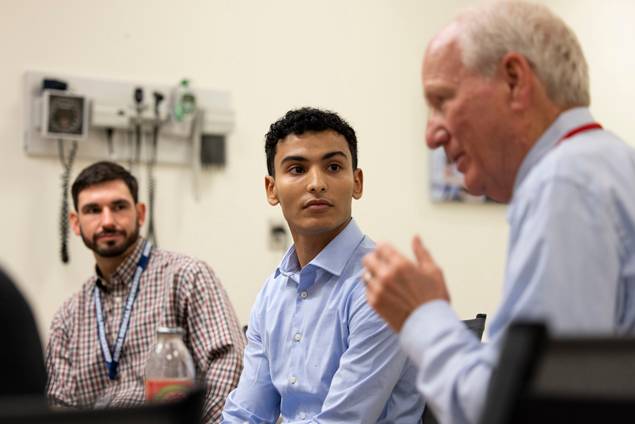How to Serve as a Remediation Faculty Representative

UGA faculty members and academic professionals who are interested in promoting academic integrity and practicing Restorative Justice can serve as Remediation Faculty Representatives during Restorative Justice Conferences. In these meetings, they will represent UGA's body of faculty as a party that was harmed through cheating (alongside a Remediation Peer Educator who will represent UGA's student body as a harmed party).
Restorative Justice Conferences serve the purpose of bringing together students who have caused harm to the academic community by committing academic misconduct and two parties that have been harmed by their actions — other students and faculty. Remediation candidates will talk about their individual cases, reflect on the reasons and circumstances that led them to commit academic misconduct, and determine steps they can take to repair their damaged integrity and the harm they have caused.
The Role of Remediation Faculty Representatives
The role of Remediation Faculty Representatives during Restorative Justice Conferences is to:
- help remediation candidates understand how academic misconduct hurts faculty and the university as a whole;
- share their own experiences with academic misconduct and what impact it has on their work, their careers, and their personal lives;
- propose and/or agree on specific steps remediation candidates should/want to take to repair the harm they have caused;
- give helpful advice on how remediation candidates can engage in professional development.
Remediation Faculty Representatives need to be able to listen carefully, put themselves in the shoes of students who committed academic misconduct, and support them in their efforts to engage in personal development and make amends to the academic community. They need to be trustworthy, supportive, non-judgmental, committed to Restorative Justice, and have a deep interest in helping students learn from mistakes.
Time Commitment & Training
Remediation Faculty Representatives should expect a time commitment of 2 hours every other month (1 Restorative Justice Conference). As preparation for their role, candidates will undergo a one-time 2.5-hour training which includes the following discussion topics:
- Personal experiences of student academic misconduct
- Who is harmed by cheating, and how?
- What are the goals and purposes of each step in the Remediation Program?
- What can we learn about a student from their work in the Remediation Program?
- Preparing questions for a Restorative Justice Conference
- Restorative Justice Conference Discussion Guide
- How can we help students determine their Personal Learning Objectives?
Service to the University
Some UGA departments and institutes count serving as a Remediation Faculty Representative, Academic Honesty Panelist, or Academic Honesty Facilitator as service to the university which can be reported on annual evaluations and promotion applications. These departments/institutes include (but are not limited to):
- Franklin College of Arts and Sciences
- Department of Geography
- Department of Germanic and Slavic Studies
- Department of Mathematics
- Department of Plant Biology
- Department of Psychology
- Department of Religion
- Terry College of Business
- Department of Economics (not for TT, but good for tenured)
- Department of Management
- Department of Management Information Systems
- Department of Marketing
- J.M. Tull School of Accounting
- Mary Frances Early College of Education
- Department of Communication Sciences and Special Education
- Department of Counseling and Human Development Services
- Department of Kinesiology
- Department of Language and Literacy Education
- Department of Mathematics, Science, & Social Studies Education
- College of Veterinary Medicine
- Department of Biomedical Sciences
- Department of Large Animal Medicine
- Department of Pathology
- School of Computing
- School of Public and International Affairs
- Department of International Affairs
- Department of Political Science
If your department/institute is not listed above, please reach out to your department head/institute director and let us know.
If you are interested in becoming a Remediation Faculty Representative, please contact the Office of Academic Honesty at honesty@uga.edu. We are looking forward to working with you!
